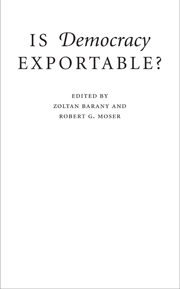1 - The Morality of Exporting Democracy: A Historical-Philosophical Perspective
Published online by Cambridge University Press: 05 June 2012
Summary
Ours is an era in which democracy is bent on proliferating itself with an energy that is breathtaking. The European Union, having mushroomed to twenty-seven member nations, is now committed to maintaining democracy among a vast Eastern population that within our lifetime was once regarded as hopelessly under the heel of communist totalitarianism. Prominent Europeans have suggested that there is no reason why the spread of their democratic union should be limited by European borders or culture. Lord Ralf Dahrendorf has suggested, in a noted Munich address, that the union ought to have the ambition to extend itself, not only to Turkey and Ukraine, but as far as Singapore and New Zealand – following, as one commentator remarked, the tracks of the British empire. Pierre Manent, a leading French political theorist, has spoken with unease of the Europeans as having become dedicated to “l'empire démocratique.” The United States has for some time been engaged in a less ambitious, but, in some ways, more active and forceful policy of “democratization.” But, as we all are keenly aware, recent events, most obviously in Iraq, have aroused or deepened doubts, and strengthened criticisms, of this far-flung and diverse enterprise. The questioning is pressed through moral, but not solely through prudential grounds. We have been acutely reminded of our need and duty to articulate answers to some basic ethical questions.
- Type
- Chapter
- Information
- Is Democracy Exportable? , pp. 15 - 34Publisher: Cambridge University PressPrint publication year: 2009
- 4
- Cited by

